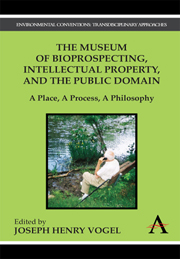 The Museum of Bioprospecting, Intellectual Property, and the Public Domain
The Museum of Bioprospecting, Intellectual Property, and the Public Domain Book contents
- Frontmatter
- Contents
- List of Figures
- Preface
- Acknowledgements
- Introduction: The Bauplan
- Chapter 1 Looking the Gorgon in the Face
- Chapter 2 Museums as Venues for Polemics
- Chapter 3 The Museum as a Vehicle for Considered Judgments on Access and Benefit Sharing
- Chapter 4 Clearing the Air: Applying the Intellectual Property Framework to National, Community, and Individual Rights in The Convention on Biological Diversity
- Chapter 5 The Anti-Commons Threat to Farmers' Rights: The Case of Crop Germplasm
- Chapter 6 The Moral Foundations of Intellectual Property and Conservation through Access and Benefit-Sharing
- Conclusions: The Nameless Interloper in The Museum of Bioprospecting, Intellectual Property, and the Public Domain
- Appendix: The Original Essay: A Proposal Based on “The Tragedy of the Commons:” Museum of Bioprospecting, Intellectual Property Rights, and the Public Domain
- Notes
- Index
Chapter 5 - The Anti-Commons Threat to Farmers' Rights: The Case of Crop Germplasm
Published online by Cambridge University Press: 05 March 2012
- Frontmatter
- Contents
- List of Figures
- Preface
- Acknowledgements
- Introduction: The Bauplan
- Chapter 1 Looking the Gorgon in the Face
- Chapter 2 Museums as Venues for Polemics
- Chapter 3 The Museum as a Vehicle for Considered Judgments on Access and Benefit Sharing
- Chapter 4 Clearing the Air: Applying the Intellectual Property Framework to National, Community, and Individual Rights in The Convention on Biological Diversity
- Chapter 5 The Anti-Commons Threat to Farmers' Rights: The Case of Crop Germplasm
- Chapter 6 The Moral Foundations of Intellectual Property and Conservation through Access and Benefit-Sharing
- Conclusions: The Nameless Interloper in The Museum of Bioprospecting, Intellectual Property, and the Public Domain
- Appendix: The Original Essay: A Proposal Based on “The Tragedy of the Commons:” Museum of Bioprospecting, Intellectual Property Rights, and the Public Domain
- Notes
- Index
Summary
Museums as temples tend to celebrate successes while those conceived as forums can give equal time to the failures. Ironically, there may be as much or even more to learn from the failures than from the successes. Indeed, the cruelest lesson from history is that no one ever seems to learn from it. Evolutionary dead-ends are rich reservoirs to escalate Benjamin Bloom's pyramid of learning (Fig. I.1) and evaluate the existing syntheses, applications, and understandings of bioprospecting, intellectual property, and the public domain.
Evolutionary dead-ends. I must admit I like it. So you're a professor of anthropology. Correct me if I'm wrong. Wasn't the Neanderthal man an evolutionary dead-end? I read that in the Tuesday edition of The New York Times a few years back. Apparently, geneticists figured out that modern man never interbred with the Neanderthals – how they figured that out, don't ask me, that part I don't remember. May be there just wasn't any chemistry among those proto-humans (The interloper from the previous chapters laughs as he gently grazes his forearms with his outstretched hand as if experiencing goose bumps. He is in a particularly garrulous mood.) But you know what? I'm not so sure that those geneticists are right! I think some of those Neanderthal genes are lurking in my former boss, if that back stabbing son of a bitch is still alive.
- Type
- Chapter
- Information
- The Museum of Bioprospecting, Intellectual Property, and the Public DomainA Place, A Process, A Philosophy, pp. 55 - 72Publisher: Anthem PressPrint publication year: 2010


